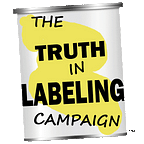Yeast extract, the new favorite in processed foods, also contains toxic manufactured free glutamate just as MSG does
Want to know the latest “market strategies” in making processed food yummy and lower in sodium?
Look no further than a recent press release on the “salt substitute market size.” According to this report, if we skip all the boring industry chatter and get right to the point, yeast extract is apparently the new darling of food companies making low-sodium processed foods.
The manufacturing methods in making yeast extract can vary, but the bottom line is that yeast extract contains toxic-free glutamate — not as much toxic-free glutamate as MSG — but still enough to do damage. That’s especially true when you think about how many sources of free glutamate there are in foods, snacks, and beverages, and how easy it is to consume a large amount.
Our favorite line from this press release, telling why yeast extract is gaining in popularity over MSG is this one: It has replaced Monosodium Glutamate (MSG), which is a sodium salt for glutamic acid. MSG contains 90% of glutamate, which can cause nausea, weakness and headache. Yeast extract only contains 5% of glutamate, making it the more preferred option.
Perhaps this could be a good advertising campaign for a food product replacing MSG with yeast extract: New and improved! Now with fewer headaches, nausea and weakness than our original version that contained MSG!
